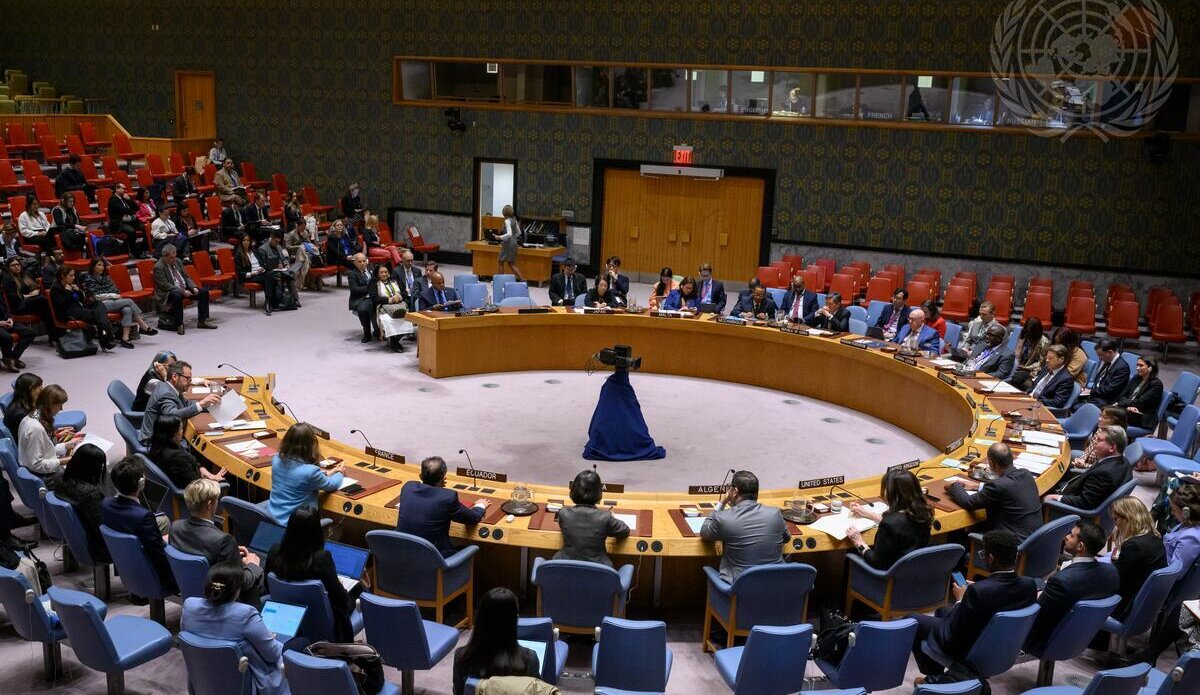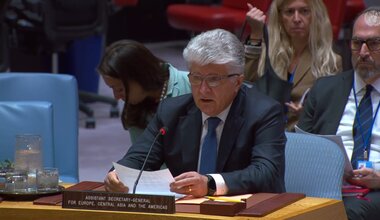Security Council Press Statement on the situation in Colombia following the UNSC session 15 October 2024
Security Council Press Statement on the situation in Colombia following the UNSC session 15 October 2024
New York, 21 October 2024. The members of the Security Council reiterated their full and unanimous support for the peace process in Colombia. They stressed the importance of ensuring the comprehensive implementation of the 2016 Final Peace Agreement. They welcomed the Government’s renewed energy for the rapid implementation of the 2016 Agreement including the new leadership from the Ministry of Interior and hoped that Interior Minister Cristo’s focus on coordinating the implementation of the 2016 Agreement will expediate efforts and bring peace dividends to communities. They also underlined the importance of strengthening the State’s presence across conflict-affected regions. In particular, the Council strongly welcomed the responsibility of the Ministry of Interior to continue to deliver the rapid response plan and its focus on land distribution and security guarantees, amongst others, towards the goal of transformation of the territories.
The Council expressed optimism that the Agrarian Jurisdiction would soon be operational and called for the full implementation of the 16 National Plans for Rural Reform and underlined its importance for territorial transformation in areas most affected by conflict. They further welcomed the joint approach between the newly appointed Minister of Agriculture and the Minister of Environment on the implementation of peasant activities in forest reserve zones. They also welcomed dialogue between the Government, national peasant platforms and the private sector to address calls for tangible progress in land delivery.
The Council also welcomed the formal adoption of the National Reintegration System and Comprehensive Reintegration Programme as well as the official establishment of Special Collective Reintegration Areas. But they continued to reiterate concern that security remains the main obstacle for reintegration efforts, including continued threats faced by former combatants and the trend of displacement of reintegration areas (TATRs).
The Council underlined the importance of security guarantees as an essential element of the 2016 Peace Agreement and welcomed President Petro’s participation in the National Commission on Security Guarantees. They reiterated their strong concern about the continued violence and insecurity affecting communities, particularly in rural areas, resulting in the killing of former combatants, Indigenous and social leaders including women and on land and environmental issues. In this context they encouraged the prompt issuance of the Governmental decree establishing the comprehensive protection programme for former combatants and welcomed the completion of the design of second action plan of the “Comprehensive Programme for the Safeguards for Women Leaders and Human Rights Defenders” and called for its rapid implementation with adequate funding. They also underlined the need for implementation in conflict affected regions of the public policy for the dismantling of illegal armed groups and criminal organisations. The Council welcomed the strengthening of the Special Investigation Unit of the Attorney-General and urged the Government and State entities to prioritise further capacity within the local-level justice system to fight impunity in the regions most affected by violence.
The Council reiterated its strong concern that conflict-related violence, including conflict-related sexual violence, continued to have a disproportionate impact on women and girls and on Indigenous and Afro-Colombian communities. They also underlined the importance of women’s full, equal, meaningful and safe participation in ongoing peace dialogue initiatives and welcomed the engagement of national women’s organisations to this end. The Council welcomed the announcement of the publication of Colombia’s first National Action Plan on Women, Peace and Security on November 9, and called for its swift and comprehensive implementation. The Council welcomed the continued commitment of the Government of Colombia to child protection and took note of the planned engagement in Colombia of the Security Council Working Group. They also expressed their strong concern about the increase of forced recruitment affecting Indigenous and Afro-Colombian communities and reiterated their serious concern about the status of implementation of the Ethnic Chapter and called for its faster implementation and called for all relevant entities to redouble their efforts.
The Council emphasized the critical role of the Special Jurisdiction for Peace (SJP) as established in the 2016 Agreement. They underlined the importance of prompt delivery by the SJP of justice in supporting the rights of the victims, and in defining the judicial situation of the peace signatories and those who have been submitted to its jurisdiction since its creation. They recalled the responsibility of the Government of Colombia in support of this process to redouble its efforts to establish the conditions for the implementation of restorative sentences. They stressed the need for greater inter-institutional coordination and information exchange at all levels to help expediate the process and enhance preparedness by State actors for the prompt issuance of forthcoming sentences.
The Council underscored the Government of Colombia’s efforts to seek broader peace through dialogue and through the continued comprehensive implementation of the 2016 Agreement. They underlined the importance of transforming the conditions in the territories affected by violence, alongside the implementation of ceasefires. They also reiterated the importance of ceasefires representing a pathway to a peace process which reduced violence and alleviated the suffering of the civilian population. They expressed disappointment that the ceasefire with the Ejército de Liberación Nacional (ELN) was not renewed, and they echoed the call of the Secretary General to re-establish the bilateral ceasefire as soon as possible and to ensure its comprehensive scope to improve security for all conflict-affected communities. They expressed concern over the stalemate in the dialogue and the expired ceasefire, but they welcomed that the Government of Colombia and the ELN have expressed their willingness to meet to examine ways to overcome the impasse. They welcomed efforts by the SRSG, the Colombian Church and other guarantor and accompanying countries to encourage the parties to return to dialogue. They emphasised the ongoing ceasefire with the fronts of the so-called Estado Mayor Central Fuerzas Armadas Revolucionarias de Colombia-Ejército del Pueblo (EMC FARC-EP) which have remained at the peace table and took note of its six-month extension until 15 April 2025, as well as the progress made, and they urged them to continue to strengthen their commitment to peace and respect for the civilian population.
The members of the Security Council reaffirmed their commitment to continue working closely with Colombia to support comprehensive implementation of the Final Agreement as the primary pillar to secure broad and lasting peace and stability in Colombia and welcomed the continued commitment of both parties to this end. The Council appreciated the Peacebuilding Commission’s written advice focusing on rural reform, the Ethnic Chapter and Transitional Justice. They also underlined the utility of greater use of the Commission’s convening power and advisory role. They strongly supported the complementary efforts by the United Nations Verification Mission in Colombia, working in coordination with the United Nations country team.
***
 UN
UN





